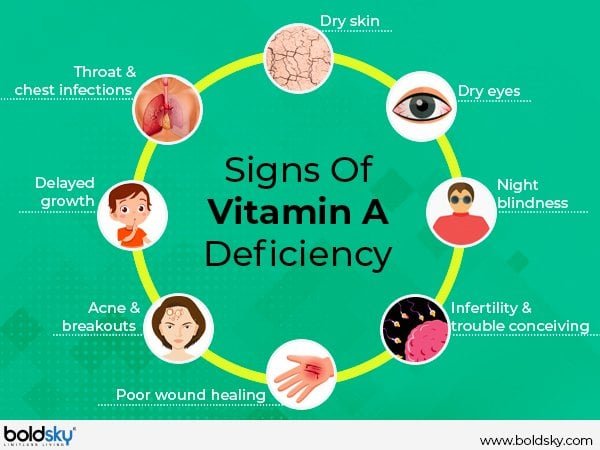The signs and symptoms of Vitamin A deficiency can affect your body in more ways than you might think. This essential fat-soluble vitamin plays a major role in vision, immune health, and cell growth. When your body lacks sufficient Vitamin A, a variety of symptoms may arise—some mild, others serious if left untreated. Let’s explore the most common warning signs of Vitamin A deficiency and how to address them.
Night Blindness: A Classic Symptom of Vitamin A Deficiency
One of the earliest and most recognizable signs of Vitamin A deficiency is night blindness. People with low Vitamin A often struggle to see in dim light or adjust to darkness. This happens because Vitamin A is crucial for producing rhodopsin, a pigment in the retina that helps with vision in low light.
Dry Eyes and Eye Irritation
Vitamin A supports the production of moisture in the eyes. When deficient, you may experience:
- Dryness
- Irritation or itchiness
- Red or inflamed eyes
In severe cases, xerophthalmia can develop, a condition that leads to thickened, dry corneas and, eventually, vision loss if untreated.
Dry Skin and Skin Infections
The signs and symptoms of Vitamin A deficiency also include dry, flaky skin. Since Vitamin A helps in skin cell regeneration, a deficiency can result in:
- Rough patches
- Cracked heels or elbows
- Increased vulnerability to skin infections and acne
Delayed Growth in Children
In growing children, Vitamin A is essential for healthy development. A deficiency can slow physical and mental development, weaken bones, and reduce immune function. Children may show signs of stunted growth or recurrent illness.
Frequent Infections and Weak Immunity
Vitamin A helps maintain mucous membranes in the lungs, gut, and urinary tract, which serve as the body’s first line of defense. Low levels can lead to:
- Frequent colds and flu
- Respiratory infections
- Gastrointestinal issues
This weakened immunity makes the body more vulnerable to diseases.
Reproductive Health Issues
For both men and women, a deficiency in Vitamin A can affect reproductive health. In men, it may reduce sperm production, while in women, it can interfere with fertility and healthy pregnancy outcomes.
Hair Thinning or Loss
Though not as common as other symptoms, hair thinning or excessive hair loss can occur with a Vitamin A deficiency. This is because Vitamin A plays a role in the production of sebum, which keeps the scalp and hair moisturized.
Wound Healing Takes Longer
Vitamin A helps cells grow and repair. If you notice that cuts, scrapes, or bruises are healing slower than usual, it could be due to a lack of this essential nutrient.
Who Is at Risk of Vitamin A Deficiency?
You may be more likely to develop this deficiency if you:
- Have a poor diet lacking in fruits, vegetables, or animal products
- Suffer from malabsorption conditions (like Crohn’s or celiac disease)
- Are pregnant or breastfeeding
- Are a child in a low-resource area
How to Diagnose and Treat Vitamin A Deficiency
A blood test can measure retinol levels to confirm a deficiency. Treatment typically involves:
- Diet changes (adding liver, carrots, spinach, sweet potatoes, and eggs)
- Vitamin A supplements as prescribed by a doctor
Final Thoughts on Signs and Symptoms of Vitamin A Deficiency
The signs and symptoms of Vitamin A deficiency are diverse, ranging from night blindness and dry skin to weak immunity and delayed healing. Early detection and treatment are key to preventing serious complications.
Eating a balanced diet rich in colorful fruits, vegetables, and animal products can help ensure your body gets enough Vitamin A. If you suspect a deficiency, consult a healthcare professional for proper guidance.
Read More: Signs and Symptoms of Vitamin D Deficiency



1 Comment
Pingback: Signs and Symptoms of Vitamin C Deficiency - Media Bites